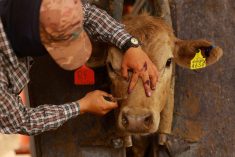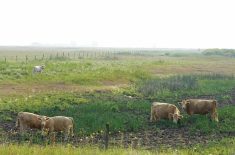A federal private member’s bill meant to tighten animal cruelty laws in Canada — alarming farm organizations and energizing animal welfare groups en route — has gone the way of most private members’ bills.
Bill C-246, introduced in February by Toronto Liberal MP Nathaniel Erskine-Smith and given first reading, died Wednesday in the House of Commons on second reading, by a “nay” vote of 198 to 84.
Erskine-Smith’s bill sought to ban imports of shark fins, and imports and sales of cat and dog fur, but also proposed “modernization and strengthening of existing animal cruelty offences in our Criminal Code.”
Read Also

Mexico agriculture secretary says still no date for restarting cattle exports to U.S.
Mexican Agriculture Minister Julio Berdegue said on Wednesday that Mexico and the United States have not yet set a date to resume Mexican cattle exports amid an outbreak of the flesh-eating screwworm parasite.
For example, animal welfare groups in recent weeks had hailed the bill’s proposed new protections against cruelty to “unowned” animals, such as feral cats and dogs and wildlife; its stiffer penalties for repeat abusers; and new rules against profiting from animal fighting.
The bill, Erskine-Smith said, also sought to close a recently revealed legal loophole in Canada’s laws against bestiality and would criminalize “all sexual conduct with an animal.”
While not opposing C-246’s more specific aims, farm groups including the Canadian Pork Council and Ontario Federation of Agriculture publicly lined up against it.
The pork council, for one, said C-246 contained language that “greatly increases the risk of livestock producers and companies facing criminal liability for producing wholesome affordable food.”
In a release Tuesday, the council also warned amendments to C-246 “will be used to test legal applications in costly court cases, which is what animal rights activists have promised to do when similar bills were unsuccessfully put forward.”
The OFA, meanwhile, has previously said that by moving animal cruelty provisions to a different section of Canada’s Criminal Code, C-246 could cause existing case law and precedents to be lost regarding “lawful activities” in animal agriculture, livestock slaughter, hunting and/or fishing.
Bill Blair, the Liberals’ parliamentary secretary for justice, also noted previously in the Commons that C-246 didn’t provide “a list of exemptions for specific lawful activities” such as ranching, hunting, fishing, trapping or medical research.
Blair noted concerns that without such exemptions in place, C-246 could “inadvertently create a conflict of law, making existing legally regulated activities illegal by the very nature of their existence.”
The bill, the OFA said, also sets up new laws around killing an animal or permitting an animal to be killed, in the bill’s words, “brutally or viciously.” Those two words, the OFA said, “are new terms” in animal cruelty law, “meaning there is no case law and no precedence.”
Robert Sopuck, a Manitoba Conservative MP, echoed those concerns in previous debate on the bill, saying the terms “brutally or viciously” could create “a new and very broad offence. For example, would the current method of cooking lobster by placing them live in a pot of boiling water be criminalized?”
Sopuck also echoed concerns that C-246 would take animal cruelty offences out of a Criminal Code section dealing with offences against certain property, and into another section “dealing with offences against persons, giving rise to the suggestion that animals are no longer a special type of property but are potentially entitled to rights that are similar to persons.”
“Accepted practices”
For his part, Erskine-Smith, a lawyer by profession, said previously he was “open to reasonable amendments and have repeatedly said so,” and does “not believe that the Criminal Code should be used to regulate accepted practices.
“Had I intended to affect farming, I would have done so through the Meat Inspection Act or the Health of Animals Act, not the Criminal Code.”
While stressing the bill was not meant to affect accepted animal use practices, he said he “completely appreciate(s) that some might want to see that in black and white” and wanted the bill to move ahead to committee review, where its “plausible effects” could be better examined.
After the bill was voted down Wednesday, Camille Labchuk, executive director for animal welfare group Animal Justice, described the bill’s death as “a very low moment for Parliament and for the Liberal government” and called on Prime Minister Justin Trudeau and Justice Minister Jody Wilson-Raybould to “immediately commit to addressing the serious shortcomings in Canadian animal protection laws.”
Animal Justice also previously described claims that C-246 would impact “lawful animal use” such as in farming as “categorically false and… a complete fabrication.”
Rebecca Aldworth, executive director for Humane Society International/Canada, said that while the group is “deeply disappointed to see the bill defeated at second reading, the Liberal government now has an important opportunity and responsibility to advance the measures within the bill.”
Sopuck, meanwhile, said in a separate release Thursday he was “very pleased that so many members of Parliament recognized the dangers of this legislation, and the terribly flawed nature of the vague wording it was proposing.” — AGCanada.com Network












